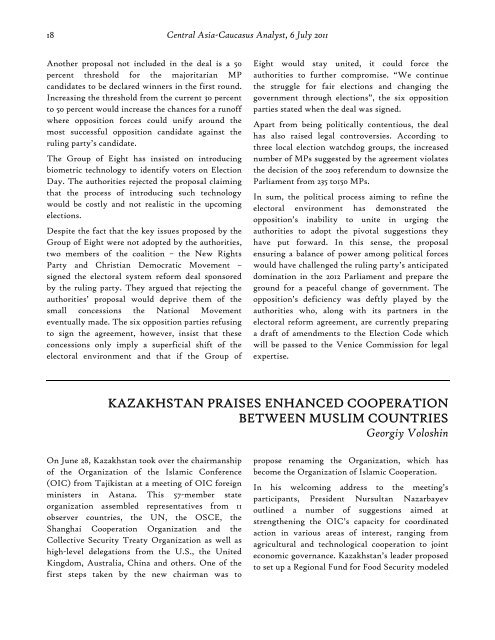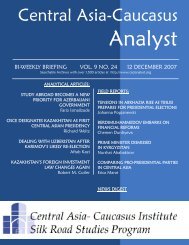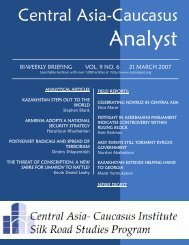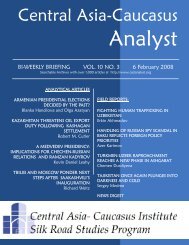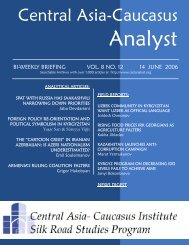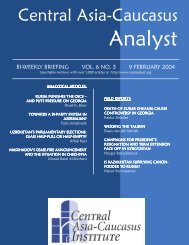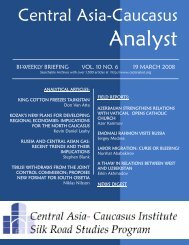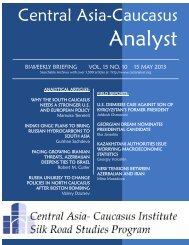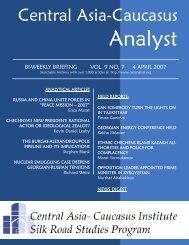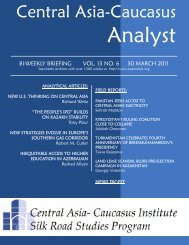No. 13, July 7 issue - Central Asia-Caucasus Institute and Silk Road ...
No. 13, July 7 issue - Central Asia-Caucasus Institute and Silk Road ...
No. 13, July 7 issue - Central Asia-Caucasus Institute and Silk Road ...
Create successful ePaper yourself
Turn your PDF publications into a flip-book with our unique Google optimized e-Paper software.
18<br />
<strong>Central</strong> <strong>Asia</strong>-<strong>Caucasus</strong> Analyst, 6 <strong>July</strong> 2011<br />
Another proposal not included in the deal is a 50<br />
percent threshold for the majoritarian MP<br />
c<strong>and</strong>idates to be declared winners in the first round.<br />
Increasing the threshold from the current 30 percent<br />
to 50 percent would increase the chances for a runoff<br />
where opposition forces could unify around the<br />
most successful opposition c<strong>and</strong>idate against the<br />
ruling party’s c<strong>and</strong>idate.<br />
The Group of Eight has insisted on introducing<br />
biometric technology to identify voters on Election<br />
Day. The authorities rejected the proposal claiming<br />
that the process of introducing such technology<br />
would be costly <strong>and</strong> not realistic in the upcoming<br />
elections.<br />
Despite the fact that the key <strong>issue</strong>s proposed by the<br />
Group of Eight were not adopted by the authorities,<br />
two members of the coalition – the New Rights<br />
Party <strong>and</strong> Christian Democratic Movement –<br />
signed the electoral system reform deal sponsored<br />
by the ruling party. They argued that rejecting the<br />
authorities’ proposal would deprive them of the<br />
small concessions the National Movement<br />
eventually made. The six opposition parties refusing<br />
to sign the agreement, however, insist that these<br />
concessions only imply a superficial shift of the<br />
electoral environment <strong>and</strong> that if the Group of<br />
Eight would stay united, it could force the<br />
authorities to further compromise. “We continue<br />
the struggle for fair elections <strong>and</strong> changing the<br />
government through elections”, the six opposition<br />
parties stated when the deal was signed.<br />
Apart from being politically contentious, the deal<br />
has also raised legal controversies. According to<br />
three local election watchdog groups, the increased<br />
number of MPs suggested by the agreement violates<br />
the decision of the 2003 referendum to downsize the<br />
Parliament from 235 to150 MPs.<br />
In sum, the political process aiming to refine the<br />
electoral environment has demonstrated the<br />
opposition’s inability to unite in urging the<br />
authorities to adopt the pivotal suggestions they<br />
have put forward. In this sense, the proposal<br />
ensuring a balance of power among political forces<br />
would have challenged the ruling party’s anticipated<br />
domination in the 2012 Parliament <strong>and</strong> prepare the<br />
ground for a peaceful change of government. The<br />
opposition’s deficiency was deftly played by the<br />
authorities who, along with its partners in the<br />
electoral reform agreement, are currently preparing<br />
a draft of amendments to the Election Code which<br />
will be passed to the Venice Commission for legal<br />
expertise.<br />
KAZAKHSTAN PRAISES ENHANCED COOPERATION<br />
BETWEEN MUSLIM COUNTRIES<br />
Georgiy Voloshin<br />
On June 28, Kazakhstan took over the chairmanship<br />
of the Organization of the Islamic Conference<br />
(OIC) from Tajikistan at a meeting of OIC foreign<br />
ministers in Astana. This 57-member state<br />
organization assembled representatives from 11<br />
observer countries, the UN, the OSCE, the<br />
Shanghai Cooperation Organization <strong>and</strong> the<br />
Collective Security Treaty Organization as well as<br />
high-level delegations from the U.S., the United<br />
Kingdom, Australia, China <strong>and</strong> others. One of the<br />
first steps taken by the new chairman was to<br />
propose renaming the Organization, which has<br />
become the Organization of Islamic Cooperation.<br />
In his welcoming address to the meeting’s<br />
participants, President Nursultan Nazarbayev<br />
outlined a number of suggestions aimed at<br />
strengthening the OIC’s capacity for coordinated<br />
action in various areas of interest, ranging from<br />
agricultural <strong>and</strong> technological cooperation to joint<br />
economic governance. Kazakhstan’s leader proposed<br />
to set up a Regional Fund for Food Security modeled


